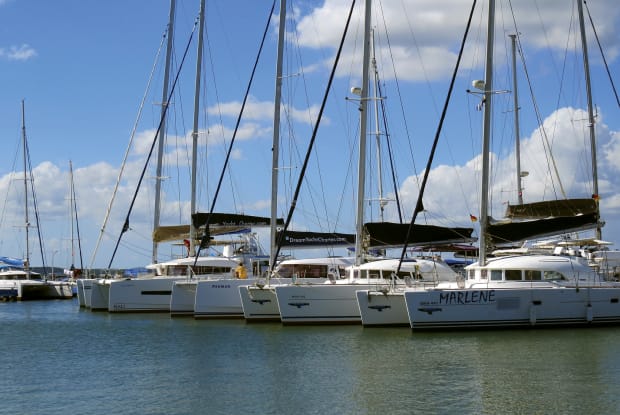
Photo by Zuzana Prochazka
Often, the trickiest parts of a charter have nothing to do with ticklish navigation, lousy weather, or seasick crew. Instead, they are about logistics and bureaucracy, and I was remembering this as the two female Cuban customs agents with hot pink nails dug through my bag with gusto. On discovering my handheld VHF radio, they lit up with a mixture of excitement and confusion. This was something to be confiscated.
“Qué es?” one demanded adjusting the fishnet stockings part of her uniform.
“It’s a radio,” I said, demonstrating how to talk into it, as if that was going to help.
“Is illegal,” she said. “No puedes tener. We keep.”
I countered with, “No, it’s safety equipment.” She shot me a look and called over a male agent who declared the radio a walkie-talkie and demanded to see its counterpart. “It’s a radio, for boats,” I said. “There’s only one.” We went back and forth a few rounds.
He demanded that I surrender it. “No, I need it for the safety of my passengers,” I said. Two more agents came by and a loud conversation in Spanish faster than I could follow ensued. I wasn’t giving up my radio, so I dug deep into my most defiant “Karen” reserves. “I need this. I’m the captain of a boat.”
Exasperated but needing to make a show of it for his colleagues, the leader shoved a form into my hand, writing “walkie-talkie” across the top, and told me that once I reached Cienfuegos (a town three hours away where the charter base was located) I had to go to the police station and surrender the radio until I was leaving the country. I smiled, nodded, took the form, the radio, and my bag, and exited to the taxi stand. I never saw the inside of that police station.
Havana wears its centuries of history with ease, from forts built by the conquistadors to the bullet holes from the Castro revolution in the walls of the Hotel Nacional, where we ordered strong mojitos after our first encounter with Cuban regulations. We had five boats in our charter group, and this was the first trip to Cuba for all of us. We were warned to “take it seriously and do it right” so we had handlers to grease the skids, but nothing prepared us for Cuba’s particular flavor of bureaucracy and the perpetual supply chain and distribution problems where everything, from boat parts to provisions, is scarce.
Suspect government cheese and brown lettuce sat in the hot sun in front of each boat at the base when we arrived. I dispatched my crew to go find mint and Havana Club rum to get us through the week, and then turned my attention to the bare-bones bareboat in front of me.
I noticed that the VHF radio wasn’t working and that the bilge pumps made howling noises as if they were injured. I called over the base mechanic who spoke not a lick of English. Eventually, we communicated, and he climbed the mast to replace the radio antenna that had gone missing. However, his solution to the broken bilge pumps was to 1) tell me that’s how variable speed pumps worked, and 2) just turn them off. Umm, no on both.
I towered over the short man and shook my head. He sighed and disappeared. About an hour later he came back very excited with a brand new pump in a box. There were smiles all around as he installed it and grabbed his tools to leave. I shook my head and led him to the other hull. “La otra también?” he cried.
“Lo siento, pero sí,” I said without a hint of giving in. He told me he had no more, and I said he’d have to find one. About three hours later he appeared with a dirty pump that had clearly been cut out of another boat. Post installation, he was gone without a trace.
A few hours later, I headed to the head on shore to wash the sweaty day off me. I walked up and pulled hard at the door. It swung open with my friend clinging to the inside handle. When he recognized me, he grew pale. Maybe he thought I was relentlessly pursuing him to the restroom with another problem.
But later that evening, I walked up to the boat where he and his coworkers were relaxing. He shrank into the corner of the cockpit hoping to hide from “la capitana loca.” I put a bottle of Havana Club on the deck and started laughing because he looked so panicked. Then he started laughing. Then we were all laughing.
Some rum, a little laughter, necessary agreement on what is and isn’t a walkie-talkie, and lots of gratitude. That’s how the skids of bureaucracy and scarcity are greased.
May 2023








